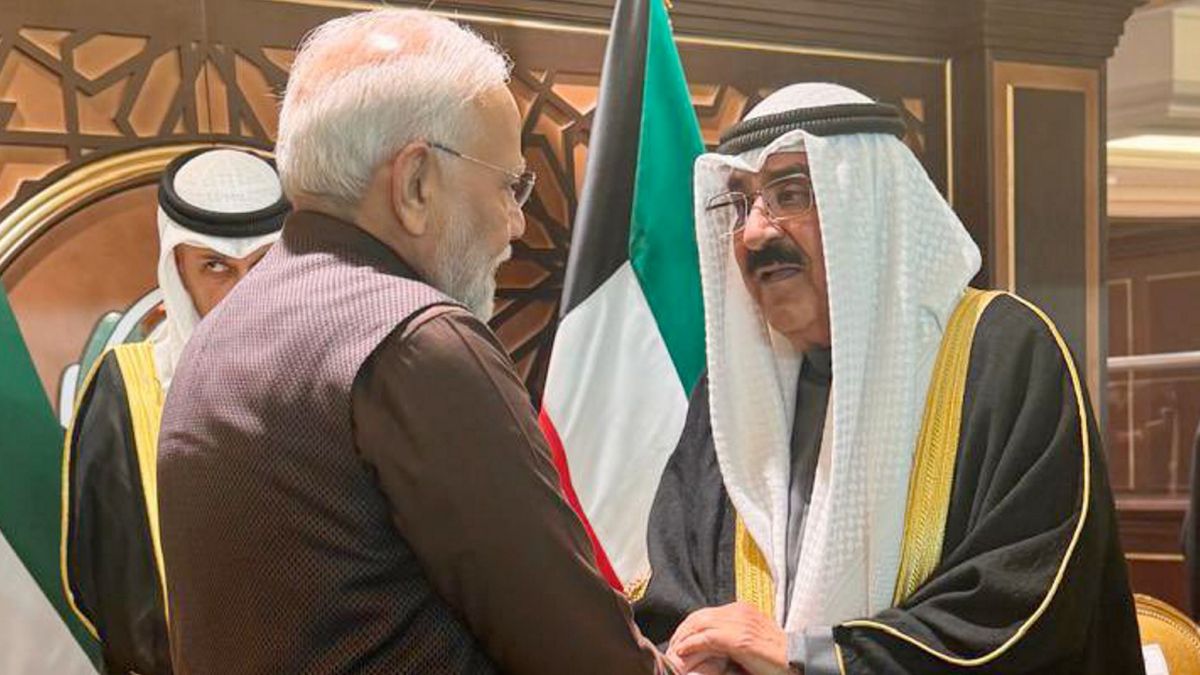Prime Minister Narendra Modi’s recent visit to Kuwait on the invitation of the Amir of the State, His Highness Meshal Al-Ahmad Al-Jaber Al-Sabah, marks a turning point in their bilateral relations and India’s ties with the Gulf as well. This visit came after 43 years of former PM Indira Gandhi’s visit to Kuwait in 1981. India’s relations with Kuwait date back to the times when oil was neither discovered or developed in the nation but now oil contributes almost 94 per cent of its income. India’s trade with Kuwait reached a total of $10.4 billion in FY 2023-24 wherein India’s export increased by 34.7 per cent than the previous fiscal year and imports from Kuwait saw a decrease of 31.72 per cent. The trade relations between both the nations are strong as Kuwait is India’s sixth largest oil importer at a value of $5.2 billion. Another significant factor in this relationship has been diaspora as Indians form the largest expatriate group in Kuwait standing strong at 1 million. India’s engagement with Kuwait has remained stagnant for quite some time but this recalibration of India’s foreign policy could be a major step to engage the Gulf nations.
Thank you Kuwait. I’m delighted by the wonderful welcome. pic.twitter.com/sz2FF40vrM
— Narendra Modi (@narendramodi) December 21, 2024
The recent visit: A renewed partnership
This visit heralded a new era in the bilateral relations between India and Kuwait as both the leaders agreed to elevate this partnership to a ‘Strategic Partnership’ and cooperate on sectors like trade, investment and defence. A significant outcome was the recent establishment of the Joint Commission on Cooperation headed by respective foreign ministers that would oversee Joint Working Groups. With respect to energy security, Kuwait agreed to discuss participation in India’s Strategic Petroleum Reserve Programme and joining the International Solar Alliance as a member opens avenues for both nations to collaborate on sustainable and low-carbon energy solutions. As Kuwait is the current Chair of GCC, therefore its agreement to support India for deepening its cooperation with GCC and concluding the India-GCC Free Trade Agreement is an important step towards deepening relations. Most importantly, the defence sector saw a historic breakthrough as both sides signed an MoU in defence that would strengthen cooperation through joint military exercises, maritime safety, personnel training and even production of defence equipment. This visit also culminated in cooperation in the field of culture via Cultural Exchange Programme for 2025-2029 and sports for 2025-2028.
#WATCH | Preparations are underway for PM Modi's ‘Hala Modi' community event to be held at Sheikh Saad Al Abdullah Sports Complex in Kuwait tomorrow, 21st Dec.
— ANI (@ANI) December 20, 2024
PM Narendra Modi will visit Kuwait on 21-22 December 2024. MEA says this will be the first visit of an Indian Prime… pic.twitter.com/eYdEkXFv8R
It is affirmative that there was some diplomatic distance between India and Kuwait especially after India’s neutral stance in Iraq’s invasion of Kuwait despite India supporting its sovereignty. As a result of this, Kuwait strengthened its ties with the West, especially the US, to manage its security concerns at the time. During the late 20th century, even India was focused on addressing its domestic economic challenges and it was only with the launch of India's ‘Look West’ Policy in 2005 and its policy of de-hyphenation that helped India to deepen its cooperation with West Asia.
Despite this, Kuwait has often been overshadowed by bigger conflicts in West Asia and larger players such as Saudi Arabia or Iran. But the recent years have seen convergence of interests between India and Kuwait, especially with its Vision 2035 which aims to make Kuwait a sustainable and diversified economy with developed infrastructure. This aligns with India’s Viksit Bharat @2047 initiative, which aims to make India the world’s third largest economy and foster inclusive economic participation. This aligning of interests can help both the nations to go beyond the traditional energy trade and explore options for cooperation in sustainable emerging technologies.
Despite these convergences the relationship suffers from labour challenges faced by Indian diaspora. It was in June 2024 that 45 Indian workers died in fire because of their dismal working conditions as they did not have adequate safety provisions. India’s efforts to engage the Indian diaspora in Kuwait has not been robust over the past decade but in this recent visit PM Modi visited a labour camp in Mina Abdullah, which reflects the importance India attaches to its workers abroad. Indian’s form 21 per cent of the total population of Kuwait and approximately 30 per cent of its workforce. India’s continued effort to engage the Indian diaspora in Kuwait will result in improved goodwill and foster people-centric diplomacy.
Conclusion
The revitalisation of India-Kuwait relations is likely to enhance bilateral cooperation in critical sectors such as defence and trade. For instance, joint maritime exercise and coastal defence can help India enhance its role as a regional balancer and responsible power in the Indo-Pacific. With respect to trade, Kuwait has the world’s fifth largest Sovereign Wealth fund and Kuwait’s investment can help India grow in critical sectors such as environmental sustainability and economic growth. The aligning of mutual interests has led both the countries to address this gap and this visit has laid the groundwork for a more resilient relationship. What remains to be seen is whether India can sustain this renewed engagement with Kuwait and improve its relations with GCC nations. A successful FTA with GCC nations would be a game changer for India, therefore, the question is whether India can translate this engagement into tangible investment opportunities and long-term outcomes.
The author is a visiting faculty and doctoral scholar at Amity Institute of Defence and Strategic Studies, Amity University.



